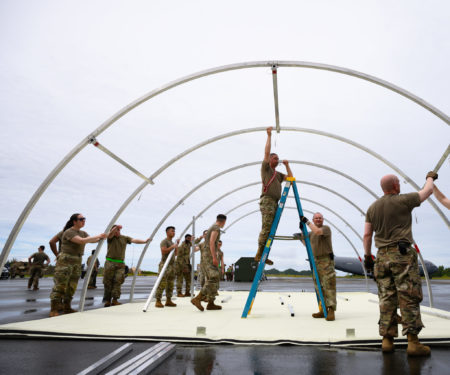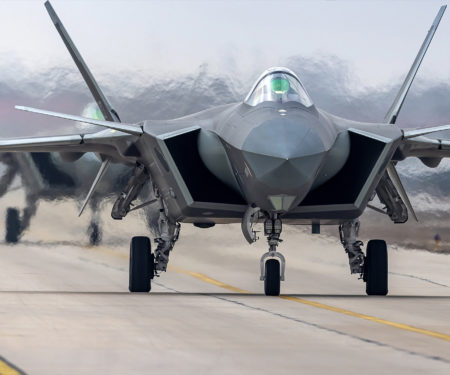Radar Sweep
Rocket Carrying New Nuclear Missile Component Explodes in Late-Night Test
A military rocket exploded July 6 during the first test launch of a key component of America’s future land-based nuclear missiles. The rocket, known as the Minotaur II+, blew up about 10 seconds after launching from Vandenberg Space Force Base, Calif., around 11 p.m. local time. “There were no injuries in the explosion and the debris was contained to the immediate vicinity of the launch pad,” the base said.
Military Identifies WWII Army Air Force Soldier From Ohio
The remains of an Army Air Force sergeant from Ohio who died after he was sent to a prisoner of war camp during World War II have now been positively identified. Tech. Sgt. William F. Teaff, 26, of Steubenville, was assigned to the 351st Bombardment Squadron, 100th Bombardment Group (Heavy), 8th Air Force. On March 6, 1944, he was the radio operator aboard a B-17 Flying Fortress bomber that was part of a larger mission to bomb targets in Berlin, according to the Defense POW/MIA Accounting Agency. German fighters attacked the B-17’s formation while it flew over the Netherlands.
Don't Call It a Flying Car: Air Force Drone Transport Develops New Identity
Then-Assistant Secretary of the Air Force for Acquisition, Technology and Logistics Will Roper made an exciting and unexpected announcement in 2019: The service was developing an acquisition strategy to get into the burgeoning market for futuristic flying cars he ultimately said could be rolling off the production line by 2023. With that target date fast approaching, the Air Force continues to work on the base technology: an electric vertical takeoff and landing (eVTOL) uncrewed aircraft that may come in a range of sizes and support missions from cargo delivery to golf cart-style troop transport. But whatever it looks like or does, Air Force officials really, really want you to stop calling it a flying car.
Satellite Companies Watching Where DOD Goes With 5G
A $600 million Defense Department initiative to demonstrate 5G wireless networks at military bases nationwide is primarily focused on terrestrial communications but is being closely watched by the satellite industry as non-terrestrial networks increasingly become part of the 5G ecosystem. These DOD experiments with 5G also will serve as an indicator of how the military intends to employ commercial technologies for fixed and mobile communications, which could shape future demand for space-based services.
Live, Virtual & Constructive Training
The Air Force is transitioning to more virtual training to give pilots an edge, saying some higher-end maneuvers cannot be replicated in real-time training. Learn more on Air Force Magazine’s Live, Virtual & Constructive Training page.
Air Force Research Lab Begins Integration, Testing for Experimental Navigation Satellite
Integration and testing activities for an experimental navigation satellite are ramping up at the Air Force Research Laboratory’s Space Vehicles Directorate as the Space Force prepares to launch its first major positioning, navigation, and timing demonstration in nearly 50 years. The lab is on track to launch the third Navigation Technology Satellite, or NTS-3, to showcase advanced capabilities for future GPS satellites or a new program to augment today’s constellation.
Pacific Powers Show Unity on Russia, China at NATO Meeting: a Sign of Things to Come?
The results of China’s bullying and unwillingness to accept international law—except when it suits the PRC’s interests—came into sharp focus as NATO and four of the most powerful IndoPacific countries joined hands at the alliance’s Madrid summit. And yet, a growing Pacific focus did not come out of nowhere for the European alliance.
Alaska’s Geopolitical Importance in the Age of Great Power Competition
Russian President Vladimir Putin’s assault on Ukraine is not only horrific, but also a strategic blunder that is undermining Russia on the world stage just as it strengthens the American-led alliance opposing his brutal actions. Putin’s strategic misstep follows in the tradition of Russian Czar Alexander II, who by selling Alaska to America in 1867 similarly weakened Russia while significantly strengthening America. A recent visit with United States Air and Space Forces civic leaders to bases in Alaska made clear that Secretary of State William Seward’s purchase of Alaska for $7 million was far from being folly, as it was called at the time. There are four reasons why Alaska is of growing importance to America’s strategic competition with rival powers.
Companies Knock, but Space Force Acquisition Portal ‘Front Door’ Remains Closed
Space Force’s acquisitions command, Space Systems Command, has been touting plans for a new one-stop-shop website for interested vendors, called the SSC Front Door, as part of an overarching reorganization designed to speed development and procurement. But for the moment, that Front Door remains essentially closed—a static website outlining future plans, with an email address for queries. A top official said updates are in the works.
How an F-15 Scored an Air-to-Air Kill by Dropping a Bomb on an Enemy Helicopter
U.S. military aviators won several impressive air-to-air engagements during the Gulf War, but perhaps the most stunning victory happened on Feb. 14, 1991, when two Airmen in an F-15 successfully dropped a bomb on an Iraqi helicopter that was in the air. Air Force Capt. Tim “Rhino” Bennett was hunting Scud missiles near Al-Qa’im in northwestern Iraq—much farther north than any other coalition aircraft were operating—when he and his weapons system officer Capt. Dan “Chewy” Bakke got word that an American special operations forces team had been discovered and was under attack from Iraqi helicopters.


